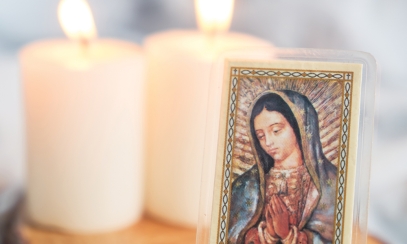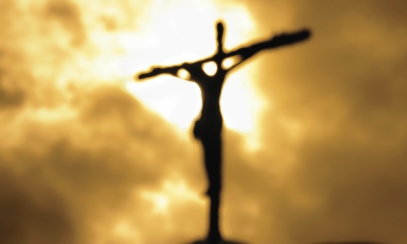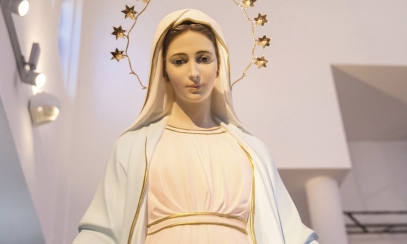
The Holy Spirit: Myths and Mystery
“The seven gifts of the Holy Spirit bestowed upon Christians are wisdom, understanding, counsel, fortitude, knowledge, piety and fear of the Lord.” (CCC no. 1845)
The Diocese of Saginaw is moving into a new era regarding the Sacrament of Confirmation, which will now take place at an older age for children. Bishop Robert Gruss, after making consultations and taking the matter to prayer, has concluded that the process of “discernment and preparation for the reception of the Sacrament of Confirmation should begin at a minimum age of 12 to 14 years old and should not be tied to a specific grade level.”
“The seven gifts of the Holy Spirit bestowed upon Christians are wisdom, understanding, counsel, fortitude, knowledge, piety and fear of the Lord.” (CCC no. 1845)
The Diocese of Saginaw is moving into a new era regarding the Sacrament of Confirmation, which will now take place at an older age for children. Bishop Robert Gruss, after making consultations and taking the matter to prayer, has concluded that the process of “discernment and preparation for the reception of the Sacrament of Confirmation should begin at a minimum age of 12 to 14 years old and should not be tied to a specific grade level.”
Confirmations are planned to resume in 2025 in our diocese. Given this development, it is an opportune time to turn our eyes to the Holy Spirit and the Sacrament of Confirmation – and to dispel some common myths.
What is the Holy Spirit?
The Holy Spirit is truly God. Thus, we rightly worship him as God together with the Father and the Son, as we profess in the Nicene Creed: “I believe in the Holy Spirit, the Lord, the giver of life, who proceeds from the Father and the Son, who with the Father and the Son is adored and glorified, who has spoken through the prophets.”
Who is the Holy Spirit?
He is the third Person of the Holy Trinity, who eternally proceeds from the Father and the Son as from one source. As Frank Sheed explains in his classic little book, Theology for Beginners, the eternal, infinite love between the Father and the Son is so perfect that it gives rise to a third divine person, the Holy Spirit. God has revealed something that we never could have guessed at with our own limited minds: namely, God is actually a community of three divine persons eternally giving and receiving perfect love. And “the bond of love” in the Trinity is precisely the Holy Spirit.
What are some common myths connected with the Holy Spirit?
MYTH: “Every time ‘Spirit’ or ‘Holy Spirit’ appears in the Bible, it refers to the third Person of the Holy Trinity”
Catholicism offers a helpful guideline that shows this statement is inaccurate. How can we be certain that a passage of Scripture is definitely referring to the third Person of the Holy Trinity? We must look for distinction between divine persons in the passage. For example, at the Last Supper, Jesus says to his Apostles: “When the Advocate comes whom I will send you from the Father, the Spirit of truth that proceeds from the Father, he will testify to me.” (Jn 15:26) The distinction between the three divine persons is clearly evident here, so we can be sure that “the Spirit of truth” refers to the third person of the Trinity.
Unless this kind of distinction between the Father, Son and Holy Spirit is apparent in a biblical text, “Spirit” or “Holy Spirit” or “God’s spirit” is more likely a simple reference to God – not specifically a reference to the third divine Person. After all, “‘Spirit’ and ‘Holy’ are divine attributes common to the three divine persons.” (CCC 691) From all eternity, the Father is also “Holy” and “Spirit,” as is the Son (though he did take on a human body and soul in the womb of the Virgin Mary). Most Catholic scripture scholars would therefore look at “God’s spirit” in these opening two lines of the Jerusalem Bible as simply referring to God, not as a specific reference to the third divine Person: “In the beginning God created the heavens and the earth. Now the earth was a formless void, there was darkness over the deep, and God’s spirit hovered over the water.”
MYTH: “Just as the Father is the sole Creator, so the Holy Spirit is the only Sanctifier”
The opening lines of an old hymn clarify that this is not true: “Come Holy Spirit, Creator blest, and in our souls take up Thy rest.” The Holy Spirit is Creator just as much as the Father and the Son are Creator. All the divine works of the Holy Trinity which are performed, as it were, “outside” of the inner life of God are always works of the Trinity through the one divine nature. The Father does not act as a “lone ranger” in creating the universe. Rather, creation “is the common work of the Holy Trinity.” (see CCC 292) In the same way, sanctification is also the work of the Trinity, not just an individual action of the Holy Spirit. With good reason, however, the Church sometimes puts a special spotlight on the Holy Spirit in our journey of being made holy, calling him “the Sanctifier.” This is called “appropriation,” whereby we at times attribute the action of all three divine Persons to just one divine Person.
MYTH: “As long as I have the Holy Spirit, I do not really need the Church”
Actually, this is the opposite of what Jesus desires and what the Catholic Church has taught since the Holy Spirit descended on the Apostles at Pentecost. As St. Irenaeus, recently proclaimed a Doctor of the Church by Pope Francis, once said: “Where the Church is, there also is God's Spirit; where God's Spirit is, there is the Church.” The Catechism of the Catholic Church states: “The Church, a communion living in the faith of the apostles which she transmits, is the place where we know the Holy Spirit.” (CCC 688)
MYTH: “We first receive the Holy Spirit and his seven gifts in the Sacrament of Confirmation”
It is in Baptism, not Confirmation, that we are first filled with the Holy Spirit and receive his seven gifts (along with receiving the indwelling of the Father and the Son). Catholic teaching proclaims that through Baptism, each Christian truly becomes a temple of the Holy Trinity as long as she or he avoids grave sin (mortal sin). Thanks to God’s mercy, even a person who commits serious sin can again become a temple of the Trinity through the Sacrament of Reconciliation or through an act of perfect contrition, based on love of God rather than the fear of hell. Perfect contrition can obtain forgiveness of mortal sins “if it includes the firm resolution to have recourse to sacramental confession as soon as possible.” (CCC 1452)
MYTH: “The Sacrament of Confirmation perfects the Sacrament of Baptism”
The late Bishop Robert Christian, who taught sacramental theology for many years at the Angelicum in Rome, used to remind seminarians and us lay students that there is nothing deficient in the Sacrament of Baptism. Confirmation does not perfect Baptism – it helps perfect the baptized person by a fresh outpouring of the Holy Spirit: “By Confirmation, Christians…share more completely in the mission of Jesus Christ and the fullness of the Holy Spirit with which he is filled, so that their lives may give off ‘the aroma of Christ.’” (CCC 1294) Confirmation “increases the gifts of the Holy Spirit in us.” (CCC 1303)
May each of us give the Holy Spirit radical permission to lead us in every detail of our lives – even in unexpected ways – just as the Spirit did with the first followers of Jesus.
Dr. Dan Osborn is the Diocesan Theologian and Coordinator of Permanent Diaconate Formation & Ministry for the Diocese of Saginaw.



